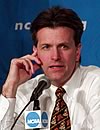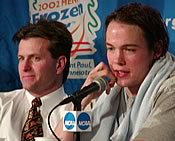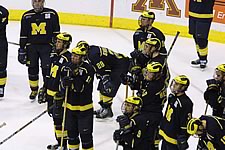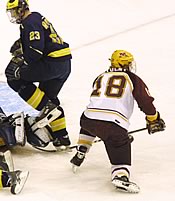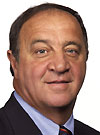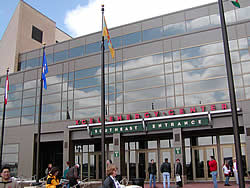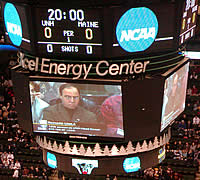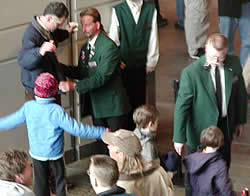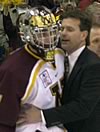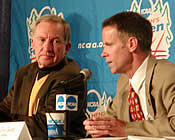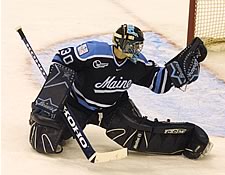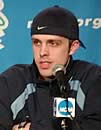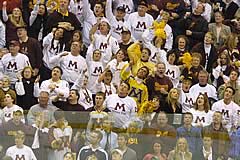Dreams simply don’t come true enough in real life. The movies write great scripts, but everyone knows fantasy, storybook endings are reserved for Hollywood.
Certainly St. Paul, Minn., is not the stage where one would expect one of these Hollywood-like segments to be filmed. But if I were a producer, I might want to hop on the next plane and make sure I have a way into the Xcel Energy Center on Saturday night.
Fantasy and dream could become the reality for a group of young men and their energetic coach from the University of Maine, who look to turn the improbable into a national championship.
A victory for the Black Bears Saturday would cap a remarkable late-season run that saw the once below-.500 club march up the Hockey East standings, qualify for the national tournament and pull off two upsets to get a date with the Minnesota Golden Gophers in the title tilt.
“We still have a job ahead of us and we have one more game,” said interim head coach Tim Whitehead, who after spending five years as head coach at UMass-Lowell, took over the Maine program just days before the season opened after legendary coach Shawn Walsh succumbed to cancer. “We are very fortunate to be playing in the last game of the season. Only two teams have that opportunity.”
Not only would a win have sportswriters searching for a thesaurus to find synonyms for “miracle,” it would also deny fans in the college hockey Mecca of Minnesota the opportunity to witness their beloved Gophers claim their first national title since 1979 on what is effectively home ice.
That may be the biggest key to Maine’s success — taking the Gopher faithful who will account for probably 17,000 of the 19,000-plus in the building, out of the game. Surviving the opening minutes and keeping the momentum away from the Gophers will likely be the difference between winning and losing.
Maine knows that this can’t turn into a game of special teams similar to Thursday’s semifinal win over UNH. Though Maine’s penalty kill was stellar, even to take the penalties could have spelled doom.
“The reason we took a couple of penalties was we were getting out of position defensively, and then we were caught in some situations when we had to hook or hold,” said Whitehead. “But really what we needed to do was to stay in better defensive position.
“So we got a couple of penalties in that regard. I thought we did a good job as the game went on of tightening up that situation.”
Lucky for Maine that its penalty kill was perfect on the afternoon, but as Whitehead noted, that was a point of focus.
“We definitely worked on our penalty kill. We actually worked on our penalty kill every day since the [Hockey East] championship game,” noted Whitehead, who hopes to bring the national championship back to Maine for the third time in a decade. “It was something that we needed to improve on. The bottom line is that we weren’t working hard enough on our penalty kill and our power play.”
On Thursday, the power play struggled a bit. While failing to convert on its first three opportunities, the Black Bear man-advantage gave up what looked like a backbreaking shorthanded tally that gave UNH a 2-1 lead. Eventually Maine did strike with the extra man, but that was long after the contest was decided, using its fourth-liners against a less-than-enthused UNH penalty kill.
“Our power play has been pretty consistent this year,” said Whitehead. “We are up to about 30 percent and that’s great, but we as coaches did not feel that we were working as hard as we could in those situations.
“Five-on-five we were working very well in those situations, but we felt that we were not winning loose pucks.”
Similar to Maine’s last national title, the team has arrived at the championship game using an important concept: balance. Boasting a potent offense, Maine doesn’t have a 50-point scorer, but 13 players have double-digit point totals, and four — three forwards and defenseman Peter Metcalf — have 40 points.
“We’re going to need everyone to contribute when we step on the ice in the championship game,” said senior Niko Dimitrakos, who joins Metcalf as the only players on the club who played in the 1999 title game.
“We don’t have any 76-point scorers,” he said, referring to the totals for national leaders John Pohl and Darren Haydar. “It’s pretty well-balanced across the board.
“We roll four lines. We use the term ‘tidal wave.’ Everybody gets on the ice and everybody’s legs are going. We’re just a fun team to watch.”
One other thing that could be at stake in this title game is the future of Maine’s coach. Whitehead still bears the moniker “interim” after replacing Walsh, but a win on Saturday could cement him the job. The university, though, has said all along that it will conduct a national search for a head coach at the conclusion of the season.
Whitehead says that his future with the program is the last thing on his mind.
“I think we haven’t had a lot of time to sit back and look at the season,” said Whitehead. “I’m just focusing on the task at hand right now, and trying to keep the team focused and go about our jobs.”
Without a doubt, that’s the only mentality to take. The future is now for the Black Bears.
The script is written. The producers are ready. Maybe Emilio Estevez is available for another movie — he’d be lucky to have the chance to play Tim Whitehead.
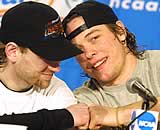
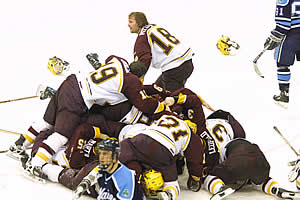
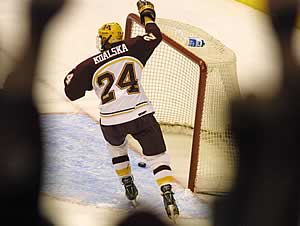
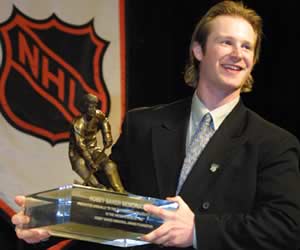
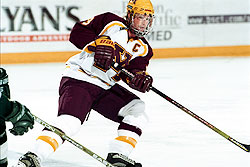
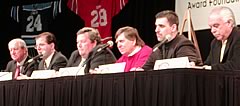
![Rocky Reeves accepts the 2002 Hockey Humanitarian Award from [nl]Notre Dame coach Dave Poulin. (Photos by Pedro Cancel)](https://www.uscho.com/images/colorscans/20012002/ncaa_reeves_hum.jpg)
